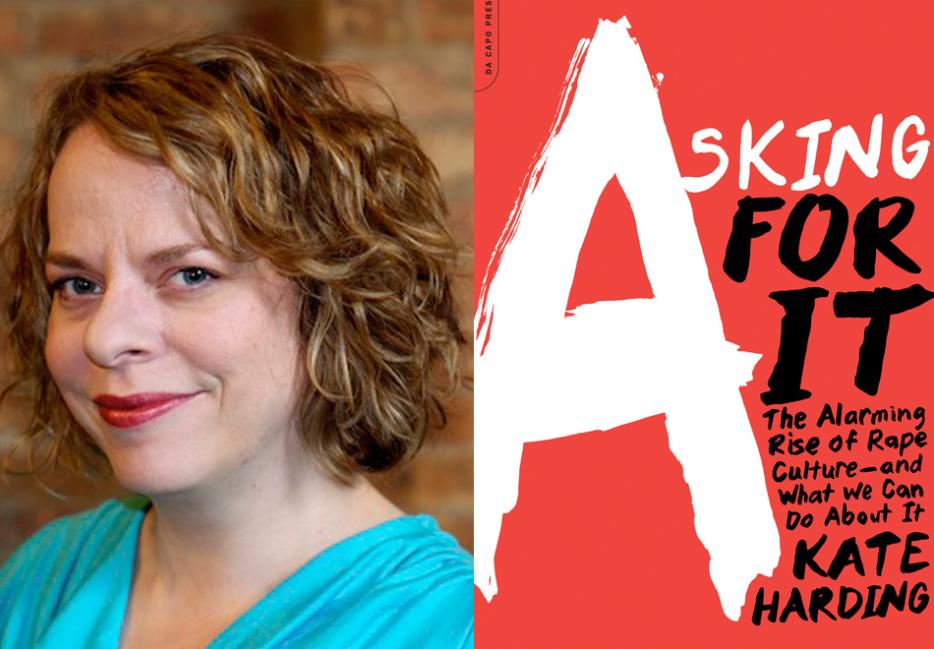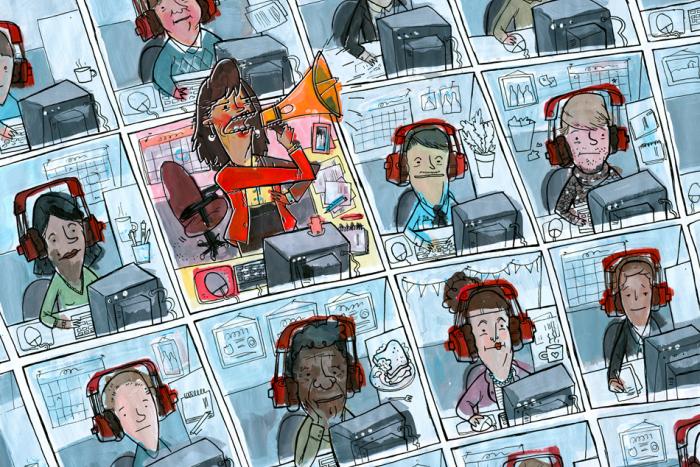I am not capable of being objective about Kate Harding. She's one of my best friends, and one of the funniest, most clear-headed, most uncompromising feminist writers working today—which means that, on a cultural level, she's one of your best friends, too. So when I say that her book Asking for It, which was released August 25, is simultaneously an unstinting indictment of our cultural attitudes about women and sex and a paradoxically hilarious page-turner, I can see why you might be skeptical, but it's true.
Asking for It is a gimlet-eyed look at rape culture—the constellation of fears, biases, and deeply ingrained beliefs that make us excuse rapists and treat their victims like criminals. In the three years since Kate started working on the book, we have seen this culture in action over and over, on the local and national levels; we have had these conversations dozens of times. But Asking for It doesn't just read like a retread of the sharpest tweets about Steubenville, about Rolling Stone, about Emma Sulkowicz, about Bill Cosby. Harding zooms out to look at how every part of society—our ingrained racism, our stinginess about reproductive rights, the way we train our police, the things we watch on TV—is complicit in facilitating rape. And unlike the justice system, she doesn't let the culprits off the hook.
However, I am not capable of being objective, as I said. I’ll let Harding, who also co-wrote The Book of Jezebel and is a columnist for Dame, speak for herself, and you'll see what I mean.
*
Jess Zimmerman: Let's start by talking about the phrase “rape culture.” You say in the introduction that you're kind of resistant to it, and I think other people are resistant to it too. Why does it get people's backs up? What made you decide there was no way around using that phrase?
Kate Harding: I mean, if you haven't thought about it very hard, or read feminist takes on the subject, the idea that we're living in a rape culture sounds completely ridiculous. Nobody is pro-rape! And we're not in an area where, say, mass rape is used as a weapon of war. But once you look a little closer, you see that actually, although we say we think rape is the second worst crime after murder, we don't treat it that way at all. And we don't, as a culture, show any real interest in punishing rapists or preventing predators from finding other victims. Not the most common sexual predators, anyway. We're super keen to punish the stereotypical stranger rapist who uses a weapon—if we can find him—but that's a tiny fraction of actual rapes.
JZ: Well, and it's also worth looking at why we think (or say we think) rape is the second worst crime. You make this point really strongly in the book—we say we hate rape, as a culture, for the reasons we should hate rape, i.e., that it's a violation of someone's right to body autonomy. But we act like we only care about preserving women's purity.
KH: Yes, great point.
JZ: It's your point! I'm just stealing it.
KH: When you scratch the surface, you see that we still have this really Victorian—if not medieval—view of rape. When an “innocent” victim (i.e., a virgin) is sullied with the filth of rape (i.e., sex), it's the end of the world. But when someone who has a consensual sex life, on her own terms, has her bodily autonomy violated, we're a lot more likely to respond with ¯\_(ツ)_/¯.
JZ: And that's not even guesswork, since politicians and other public figures have EXPLICITLY said that they basically only care if it's a religious teenage virgin ruined by a stranger. Preferably a brown stranger. Obviously a white virgin.
KH: Yes, exactly. I feel very conflicted when I see men like this kid from Baylor get convicted. Part of me is so glad that for once, a rapist received consequences from the justice system, but I can also make an educated guess that it wouldn't have happened if he'd been a white man who raped a young black woman.
Basically, we're still conflating rape and sex, and acting like the crime is putting a dick inside a “good” girl who's saving herself for some imagined husband, as opposed to penetrating another human being's body without their consent.
JZ: Occasionally while reading the more infuriating quotes in your book, I thought about the last book we discussed together, Naomi Wolf's Vagina, which also weirdly privileged the act of penetration with a penis, like it was this especially significant thing that somehow brings the vagina into the fullness of its potential. People are weirdly hung up on which genital goes where, which has a lot of effects, including the eliding of male rape.
KH: And then that makes it hard to talk about rape culture as it applies beyond penis-in-vagina sex... JINX!
JZ: Jinx, poke, owe me a discussion of rape culture.
KH: EVERYONE CHECK OUT MY INTERVIEW WITH SERIOUS LITERARY PUBLICATION HAZLITT.
But yes, it is worth noting that as far as we know, women are raped at much higher rates than men—and trans women at much higher rates than cis women. But there are still millions of male victims dealing with an entirely different kind of stigma. And rape culture, by focusing so much on the purity of innocent white girls, shoves their stories and needs aside.
The thing that brings it home for a lot of people is talking about rape in the military. The percentages of military women raped are much higher than the percentages of men. One anonymous survey found that 23 percent of women and four percent of men in the military reported unwanted sexual contact. But in terms of sheer numbers, more men than women are raped in the military, because there are so many more of them in the first place.
Also, I like to remind people that men are much more likely to be raped than to be the victims of a false rape report.
The best way to get people to believe you were raped is to also get murdered by the same guy.
JZ: To me, the thing that makes “rape culture” the most apt phrase is that it's not just the way we condone the act of rape, or make excuses for it, or put the onus of responsibility for rape where it doesn't belong, or let rapists go free. I mean, it's all of that, but it's also the million sub rosa ways that our culture promotes the idea that women's bodies are public property.
You talked about a police survey in which most—but, crucially, not nearly all—police officers gave the right answers to things like, “If a woman is wearing a short skirt, is she asking for rape?” But the thing about the pervasiveness and perniciousness of rape culture is that even if you know the right answers, part of you has been trained to think that if a woman is being obviously female in public, it's open season.
KH: Yeah, most police officers knew the right answers to give to a sociologist measuring their “rape myth acceptance,” but a) NOT ALL, and b) giving the right answer doesn't mean you'll actually put the right answer into practice when investigating a rape case.
JZ: I guess my point is that rape culture means that's true of basically everyone. Obviously it's worst with police and, like, ER staffers, and lawyers, and the people who have the ability to re-traumatize a victim or dissuade them from pursuing a case. But just in general, even when we know the right answers, rape culture is this devil on the shoulder. Compare it with the findings that a third of college men will admit to committing sexual assault as long as you don't call it that.
KH: There are amazing parallels with the way white people deal with racism. Like, most of us will say it's terrible, unjust, not something we practice ourselves. But in addition to otherwise thoughtful people who resist thinking about micro-aggressions they might be committing, a lot of white people will flat out use the n-word, and then say they didn't mean it in a racist way. They'll say, “I'm not racist, but I just believe we should live separately.” And that's the same shit with rape culture. Nobody admits to being pro-rape, but we're all knocking ourselves out to defend rapists, smear victims, and sow doubt about EVERY FUCKING INSTANCE OF RAPE where the victim isn't beaten within an inch of her life, or actually killed. The best way to get people to believe you were raped is to also get murdered by the same guy.
JZ: Yes! We're like a bunch of fish going, “Oh no, I hate breathing water, none of that for me.”
KH: Exactly. So we have this overblown fear of false accusations. Like, they are scary things! For anyone! But it's a fear that should be parallel to, like, dying in a plane crash—and we act as though it's as common as dying in a car crash.
JZ: I loved how you dealt with false accusations in the book, because it was something I genuinely had not put together: that the actually false accusations sound more like our cultural idea of, pardon me, “rape-rape.” Because nobody makes up stories for attention that will just get them dismissed and disbelieved and maybe insulted! That'd be like having Munchausen's and telling everyone you have fibromyalgia. “Oh, this gets taken seriously, this definitely won't cause people to doubt my veracity and moral fiber.”
KH: Guys think that if a woman they have sex with takes a notion to accuse them of rape, all she has to do is walk into a police station and lie, and suddenly his life is ruined. In fact, it's the opposite all around. As soon as he tells police it was consensual, there's every chance the whole thing gets dropped. Hell, there's every chance that the police will bully her into dropping it before they even have to go investigate. And meanwhile, when a woman who WAS raped reports it, she gets investigated like a criminal subject. Of course someone looking for attention and sympathy isn't going to say, “This guy I met at a bar last night forced himself on me.” She's going to say she was abducted at gunpoint by a masked stranger, or something equally dramatic and difficult to investigate thoroughly.
JZ: Totally. The idea that women would report consensual sex as rape just for “revenge” presupposes that reporting causes more problems for the accused than for the accuser. And with rape, that's just not how it plays out. (I mean, at some point in the future I hope that reporting will not cause problems for the accuser. And at that time, I still do not expect a cascade of false rape reports, because contrary to popular opinion, women are not all monsters.)
KH: As far as fucked-up attitudes being to blame, the worst version of that is when police believe a false stranger rape story and basically keep pushing a victim to accuse a specific man. That's how Gary Dotson, one of the first people to be exonerated by DNA, ended up in prison. Cathleen Crowell Webb reported an anonymous stranger rape, and they basically shoved mug shot books in front of her and made her pick. She didn't have to pick, of course, and could have come clean at any time—I'm not making excuses for her—but it takes a village to actually put an innocent man in prison, basically.
JZ: But letting a guilty man off the hook so he can go rape again—it only takes one jerk to do that.
KH: This idea that women will make false accusations at the slightest provocation—like, because we're pissed that some one night stand never called—evinces such a horrifically bleak view of women. Like, you shouldn't even have to be a feminist to give that two seconds of thought and go, “That's really fucked up. Most people, including lady-people, would not lie to police in hopes of ruining someone else's life.”
JZ: Okay so can I play Devil's Advocate for a second here? In the sense that I want to ask you a question I know the answer to, but that I think it would be useful to discuss explicitly. And also in the sense that I am wearing a trilby and a goatee.
KH: You can, as long as you send trilby pics.
Someone who's not sexually experienced has seen all these images of people getting it on that are wordless and quite literally choreographed. Nobody has to speak while fucking, if they're play-fucking according to a script. In the real world, telepathy doesn't work that well.
JZ: One point that you underscore a few times is that most men who commit sexual assault know exactly what they're doing, and will continue doing it as long as they can get away with it. But does rape culture actually make it harder for men to understand what they're doing wrong? Like, they're getting constant messages that consent is given once, usually nonverbally, and applies indefinitely thereafter, and women's bodies are public goods. And all they've got standing against that is common sense and empathy. I find that most people who can get away without having those choose to do so.
KH: I'd turn it around and say rape culture makes it easier for rapists to claim they didn't know, and for non-rapists to think that's plausible.
JZ: Oh it 100 percent does. But does it also make it easier for people who are merely egomaniacal doofuses to actually not know any better?
KH: I mean, maybe I'm really Pollyanna here, but I think most people would not want a sexual partner who is limp or unresponsive, let alone visibly suffering.
JZ: My assessment of how dumb men are capable of being is perhaps too towering.
KH: I don't think “enthusiastic consent,” let alone “no means no” is actually a very high bar to clear. But I feel like so much of this what-if? conversation is driven by people who must not be very sexually experienced, you know?
JZ: Yeah, you note in the book, “Real people having real sex deal with this shit”—i.e., negotiating ongoing consent—“all the time.” And I wrote in the margin, “This is the one thing I might feel comfortable pointing fingers at porn for.” Because I am pro-sex-worker and I find the whole blame-porn-for-shitty-attitudes-about-sex thing extremely boring and bad. But, why doesn't more mainstream porn show people negotiating consent? IT'S SO HOT.
KH: With you on all of the above, but I'd add that it's not just porn. Romantic comedies don't show people negotiating consent, either. So someone who's not sexually experienced has seen all these images of people getting it on (implied or otherwise) that are wordless and quite literally choreographed. Nobody has to speak while fucking, if they're play-fucking according to a script. In the real world, telepathy doesn't work that well.
Anything where people are making out and falling backward into bed to a swelling (ha) soundtrack—like, sometimes that happens. But sometimes, you stand up to go to the bedroom and fall over and bust your late ‘90s-era laptop screen to the tune of $2,000, and then there's talking again. (ASK ME HOW I KNOW.)
JZ: I was thinking this in regards to the hotly contested Game of Thrones rape scene—the first hotly contested GoT rape scene I should say—which you discussed in the book. The director essentially does a fucking PowerPoint on all the subtle clues that Cersei is actually into it even though she said she wasn't, and I'm like, “Man, how hard would it have been to just have her say 'I want you'?”
KH: RIGHT! When we see an actual discussion of consent in pop culture, it's usually the woman saying “No,” and the man pressuring her.
JZ: I think people actually WANT to preserve the illusion that good sex is one degree off from rape.
KH: Yeah, I think I agree with that, and it's super scary.
JZ: Maybe partly so they can point to that and say “so how was he ever to know,” and maybe partly because you get the messages that women are public utilities essentially in parallel to the rest of your sexual and romantic development.
KH: I mean, I do want to throw in here that there are lots of ways to gauge enthusiasm that aren't necessarily verbal. I'm not advocating ONLY Antioch College-style negotiations. But yeah, these are the things that create that social license for rapists to operate. Non-rapey guys think hot sex is wordless and a hair off from rape, so how can they blame a guy for not knowing?
JZ: I agree that it doesn't always need to be verbal! But if you're feeling like things are in any way ambiguous, it doesn't actually HURT anything to ask, “Do you like that?” It is, in fact, extremely hot, and maybe that's just my personal preference, but I've heard a lot of women express that same opinion. Plus, it keeps you from accidentally raping someone, if that's even a thing.
KH: No, I think it's hot, too—we don't leave room in this culture for the possibility that it COULD be hot.
And yes, sometimes you have to use your goddamn words. If your partner is cutting off circulation to your left foot, just grimacing isn't going to solve your problem.
JZ: Most people wouldn't think twice about saying, “Get off my foot,” or doing so if asked.
KH: I use that as an example because it's the kind of thing people don't often think of when claiming that verbally checking in with your partner will kill the mood.
JZ: You're totally allowed to have preferences, re: whether someone cuts off circulation in your foot.
KH: Exactly. But not whether someone penetrates your body.
JZ: Whether someone puts part of them inside part of you, though...
KH: Jinx, poke, have another rape joke.
Seriously, though, there are often logistical issues during sex, and people talk about them as necessary without throwing tantrums over the mood being killed.
JZ: I am thoroughly convinced by your argument that people who disbelieve this either aren't having sex, or aren't thinking seriously about what sex is like in real life, or possibly have a pernicious commitment to the idea that sex is rape-lite.
Shifting gears a little: this book took longer than you expected to write, mainly because rape culture kept happening. So you're originally envisioning being steeped in this stuff for six months, and it ended up being... two years? Three? HOW DID YOU COPE?
KH: Sometimes I coped, and sometimes I didn't. Righteous fury helps me process a lot of this stuff, as does knowing I can help contextualize it in ways that will make other people furious. But there were definitely times when I had to take extended breaks. Like, “Oops, I didn't write anything for almost a month and couldn't bear to look at my Google Alerts.” Then the fury would take over again, and I'd get back to work.
JZ: You have a lot of genuine laugh lines in here. Is humor partly a way of making the unthinkable thinkable? Or is it just impossible to take on this level of hypocrisy without mocking it?
KH: Both. I mean, my immediate reaction to so much of this stuff is, “ARE YOU FUCKING KIDDING ME?” So that informs everything.
A lot of it is just that I am the type of person who locks onto the absurdity in almost any situation, and intense emotion often goes hand-in-hand with absurdity. So this is how I naturally write about difficult subjects, but that's part of what made me want to write about it. I know I can frame this in a way that people find a lot more readable than academic feminist theory. Although, of course, there will always be people who think I'm too glib and swear too much. They're not wrong about the swearing.
JZ: Yes they are.
KH: I'm not saying all swearing should be excised, just that I've never published anything where I couldn't have taken a few “fucks” off the top and made it more polished.
JZ: But you had no fucks to give.
KH: I SEE WHAT YOU DID THERE.






